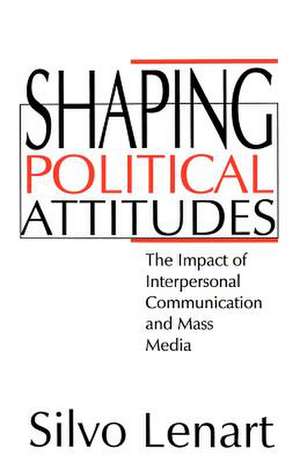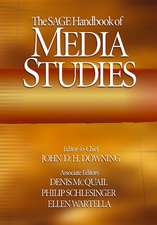Shaping Political Attitudes: The Impact of Interpersonal Communication and Mass Media
Autor Silvo Lenarten Limba Engleză Paperback – 15 aug 1994
| Toate formatele și edițiile | Preț | Express |
|---|---|---|
| Paperback (1) | 605.68 lei 43-57 zile | |
| SAGE Publications – 15 aug 1994 | 605.68 lei 43-57 zile | |
| Hardback (1) | 839.21 lei 43-57 zile | |
| SAGE Publications – 29 aug 1994 | 839.21 lei 43-57 zile |
Preț: 605.68 lei
Preț vechi: 712.56 lei
-15% Nou
Puncte Express: 909
Preț estimativ în valută:
115.90€ • 121.31$ • 96.46£
115.90€ • 121.31$ • 96.46£
Carte tipărită la comandă
Livrare economică 31 martie-14 aprilie
Preluare comenzi: 021 569.72.76
Specificații
ISBN-13: 9780803957091
ISBN-10: 0803957092
Pagini: 155
Ilustrații: 1
Dimensiuni: 143 x 217 x 11 mm
Greutate: 0.24 kg
Ediția:1
Editura: SAGE Publications
Colecția Sage Publications, Inc
Locul publicării:Thousand Oaks, United States
ISBN-10: 0803957092
Pagini: 155
Ilustrații: 1
Dimensiuni: 143 x 217 x 11 mm
Greutate: 0.24 kg
Ediția:1
Editura: SAGE Publications
Colecția Sage Publications, Inc
Locul publicării:Thousand Oaks, United States
Cuprins
PART ONE: PARADIGMS OF MEDIA AND INTERPERSONAL EFFECTS
Introduction
Media Influences in Politics
Levels of Interpersonal Influence
Levels of Analysis
PART TWO: DYNAMICS OF SOURCE INTERACTION
Multi-methodology
Experimental Evidence of Interaction
Media and Three Levels of Interpersonal Influence
PART THREE: THE PROCESS OF POLITICAL COMMUNICATION EFFECTS
Total Information Flow
Conclusions
Introduction
Media Influences in Politics
Levels of Interpersonal Influence
Levels of Analysis
PART TWO: DYNAMICS OF SOURCE INTERACTION
Multi-methodology
Experimental Evidence of Interaction
Media and Three Levels of Interpersonal Influence
PART THREE: THE PROCESS OF POLITICAL COMMUNICATION EFFECTS
Total Information Flow
Conclusions
Descriere
Recent research in the area of public opinion has focused most of its attention on the effect of the mass media, television in particular, as an influencing agent. The author argues that media effects are only half of the equation; the mass media cannot be seen as the exclusive source of political information. In a model of `total information flow', the media must share the political information environment with interpersonal communication. This volume bridges the gap between media and interpersonal communication and their combined effect on political attitudes and cognition.










